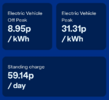and a workaround to the poor mobile comms, with the Mini, and a server setup specially to provide instant data..
Can the readings obtained through the home mini be used for billing then? I was never sure, I did wonder if the mini was only to provide data to the app as an alternative to the IHD (when I had my smart meters done last august, I was offered IHD or mini), I didn't know if there was some regulatory something or other that said the billing had to be done through data from the data collection firm (It wouldn't have supprised me if the government had done something like that in setting the rules for SMETS 2 to avoid the mess of the first generation and the smart capability not transferable...)
I was never sure, but from what you say, if yours were giving issues on BG but suddently improved when you moved to octopus and got the home mini, sounds like they can
Like you, I cannot fault octopus, I'm on Agile (And tracker for Gas), and I was able to reduce my Direct debit slightly even though I now have a electric vehicle :8



